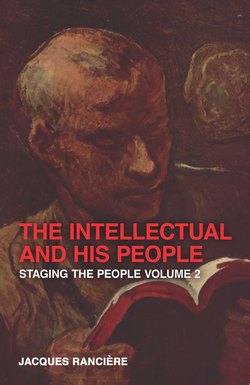The Intellectual and His People

Реклама. ООО «ЛитРес», ИНН: 7719571260.
Оглавление
Jacques Ranciere. The Intellectual and His People
Отрывок из книги
THE INTELLECTUAL
AND HIS PEOPLE
.....
For three whole hours the hills heard below them the murmur of this crowd, by turn amused, saddened, amazed, irate and relaxed, expressing in a dozen different attitudes – some still completely spontaneous, others already measured and contained – the various emotions that stirred it; a living, vibrating people, who laughed and cried as the people of Athens laughed and cried when the great heroic Muse covered the distant beating of the Aegean Sea with the sound of her verses.37
Life, emotion and expression were the three key words of this Vosgian Greece. The basis of this fraternity lay less in the play performed than in ‘the commonality of sad or joyous emotions that the magic of the theatre arouses’. Popularity was a function of the expressive essence of art, ‘the means for man to express and share with his fellows the emotion excited in him by life’.38 And the power of theatre was fundamentally the expansion of this life itself: ‘Art, the most intimate means of expression and the most direct communication of life, expands and grows all the more as it contains more life and conquers more lives.’39 Understood in this way, art did not need to concern itself with popular morality. Even if Pottecher’s play dealt with alcoholism, it did not set out to cure a single drunkard. It did not make ‘so great or so little a claim’.40 All it had to do was set the propagation of life against solitary amusement, energy that falls back into matter – that of the child toying with sand, the idle worker shifting his materials, or the aesthete turning his verses and polishing his prose. The true artist, for his part, in the metaphysical paradigm of the time, spiritualized his material into luminous energy. His freedom was thus synonymous with his capacity to offer himself equally to all. This conquering communication of life was the means of uniting the two elements that constituted the new notion of the people in the late nineteenth century: the group of ‘already independent individualities that compose the elite’ and ‘the still confused and formless masses that constitute the crowd’.41 The collective joy that united the philosopher with the porter, by their more or less fine perception of the spectacle, was that of their common aspiration in a process which, out of the pleasure of each different person, created the principle of their ascent into the spiral of individualization. What unified the public was precisely the diversity of emotions among which this joy could be distributed.
.....